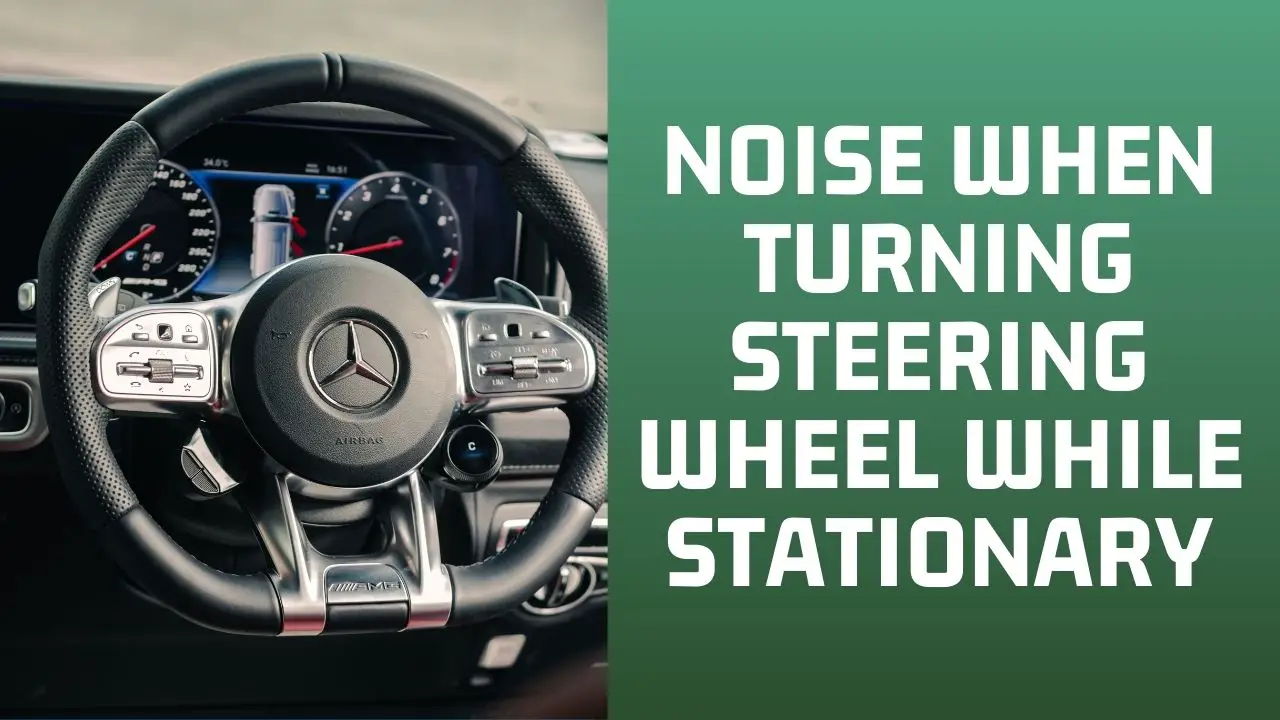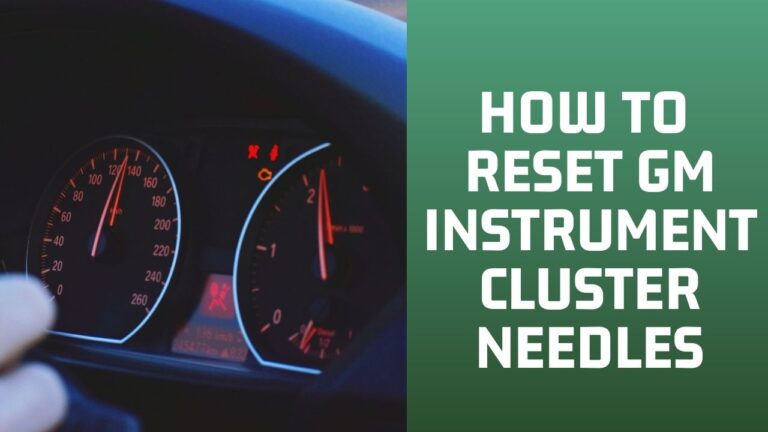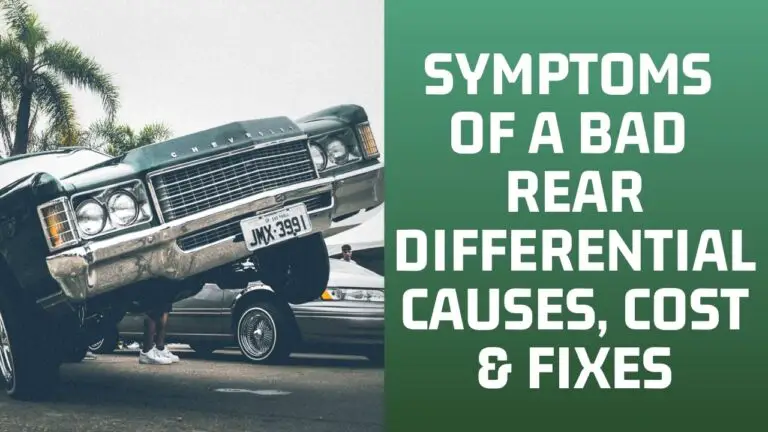Even if you’re not a car enthusiast, you’ve probably noticed your steering wheel makes weird sounds while you’re maneuvering your vehicle through traffic.
If you notice that the turn signal makes an especially loud grinding sound when you try to turn it, this could be the sign of an underlying problem with your wheels or suspension parts.
These noises are cause for concern because they could be signs of bigger problems with your steering system or other parts in the vehicle like the wheels, tires, or suspension system.
Here’s what to do if you hear these noises when turning your steering wheel and what might be causing them.
By identifying the potential causes of this noise, and working with your local auto mechanic, you can prevent costly damage to your vehicle in the future.
The best way to deal with noisy steering wheel issues is to have the parts inspected by professionals to ensure they are in good condition and replace any worn-out parts as soon as possible.
Causes of the Noise When Turning the Steering Wheel While Stationary
There are two distinct causes of steering wheel noise when turning.
One is caused by a worn or damaged inner tie rod end, and another by worn ball joints.
A humming or grinding sound when turning your steering wheel may indicate that it is time to replace these parts.
You should replace these if you notice any of the symptoms listed below.
Be sure to check all four wheels, since problems often occur in pairs, one on each side of the vehicle. This will allow you to correct both sides at once.
In many cases, replacing only one part will not solve your problem completely.
If left unrepaired, you may need to make additional repairs later on due to premature wear of other components.
It is important for safety reasons that these components be replaced as soon as possible because they are critical for proper alignment and handling of your vehicle.
The most common symptom of a bad tie rod end is when you turn your steering wheel from lock to lock (in either direction) and hear or feel a clicking sound.
Clicking sounds can also be heard while driving over bumps, especially after going over railroad tracks. These noises are usually worse during cold weather months, but may also occur during warmer months.
Whining Noise When Turning Steering Wheel While Stationary
This noise is usually heard when turning your steering wheel while stationary.
This usually means that you either have a bad power steering pump or a bad power steering gear.
If you suspect it to be a bad power steering pump, check for proper fluid level and if there is not enough then add more as required.
Then crank your engine and go out and try it again.
If you hear no whining sound at all then chances are it’s a bad power steering gear.
It’s recommended to replace both at once since they are so close together on top of each other in terms of price.
ALSO SEE: How to Unlock the Steering Wheel on a Hyundai Sonata

Creaking Noise When Turning Steering Wheel While Stationary
With your car off, slowly turn your steering wheel back and forth and listen for noise in either direction.
If you hear creaking or grinding noises when turning your steering wheel, these could be signs that something is loose.
You should take your car to a mechanic to have it checked out. The fix may be as simple as tightening up bolts or lubricating parts with some grease, but there could also be a bigger problem lurking like a cracked part or even structural damage due to an accident.
As always, don’t ignore any strange sounds from your car; they can be a sign of bigger problems.
Grinding Noise When Turning Steering Wheel
This could be a symptom of a loose power steering hose or boot.
Hoses that are frayed can wear down over time and rub against other parts, creating an annoying grinding noise when you turn your wheel.
Replacing these parts should resolve any noise issues you’re experiencing when turning your wheel while stationary.
Clunking Noise When Turning Steering Wheel Back and Forth
It could be a sign that there is an issue with your power steering system.
If you hear clunking while you turn your steering wheel back and forth, it could be a sign that your power steering pump is starting to wear out.
The typical lifespan for a power steering pump is around 60,000 miles but can vary depending on how often you drive and how long you have owned your car.
Before you start thinking about replacing your power steering pump, take your vehicle in to get diagnosed by a professional technician at your local Auto Care.
They will be able to determine if any other issues are causing your steering wheel to make noise when turning it back and forth or if it’s just time for a new power steering pump.
Steering Wheel Makes Rubbing Noise When Turning
If you’re trying to turn your steering wheel and hear a distinct, repetitive rubbing noise coming from inside, you might have a problem.
Typically, this sound can be caused by worn-out motor mounts that hold up your engine as it moves with each turn.
They’re cheap to replace, so don’t delay if you suspect they might be faulty.
You could also have an issue with your power steering system or tie rod ends.
Either way, get in touch with a mechanic right away to figure out what’s going on under there.
You could end up saving yourself some serious money down the road if you deal with these issues sooner rather than later.
Noise When Turning Steering Wheel at Low Speed
If you notice a rattling sound when you turn your steering wheel slowly at low speeds, it’s possible that one or more loose nuts on your power steering rack are to blame.
Loose nuts are common in aging vehicles and should be taken care of as soon as possible to avoid damage to vital vehicle components.
Don’t wait until it becomes an emergency, get these issues checked out by a professional today.
Noise When Turning Steering Wheel While Parked
While turning your steering wheel, you hear an unusual noise coming from your front end.
What’s causing it? And what does it mean for your car’s safety and performance?
Read on to find out.
The sound could be a sign that one or more components in your steering system are worn down or broken, and while it might not seem like a big deal, any change in how well your vehicle responds to input from its driver can be dangerous.
Here’s what you need to know about noisy steering wheels and what they mean for your car.
- When turning your steering wheel, listen for grinding noises at low speeds:
- If you turn your steering wheel slowly (in parking lots or around corners) and hear a grinding noise, it could mean that there is excess play between parts of your power-steering system.
- Excess play means there is a movement within these parts when there shouldn’t be, which makes them wear out faster than normal.
- As with all other components in your car, wearing parts lead to problems with control and responsiveness.
- Worn steering components may also create a rattling sound when driving over bumps.
- This usually indicates that loose bolts have caused additional damage to nearby parts.
- When turning your steering wheel, listen for squealing noises at high speeds:
A squealing noise is another sign of worn-out power-steering components, but it also tells you that something else is wrong as well.
In most cases, a squeal will occur only at higher speeds (30 miles per hour or above), which suggests that either your belt tensioner or power-steering pump needs replacing.
While it might not seem like much, even small changes in either of these components can affect how much effort you have to put into turning your steering wheel.
That said, if you do hear a squeal while driving, it’s best to take your car in right away.
Both of these components tend to fail suddenly, so ignoring them could cause further damage.
When turning your steering wheel, listen for clicking noises near your dashboard:
You should also pay attention to clicking sounds near your dashboard; they could indicate that one or more of your belts has come off track.
This can happen if you hit a pothole or run over debris in the road, but sometimes it happens without warning. Fortunately, fixing misaligned belts is easy, all you have to do is pull over and reattach them using a flathead screwdriver.
But before doing anything else, make sure that no other part of your steering system has been damaged by whatever caused your belt(s) to become dislodged.
Make sure everything is tight and properly aligned before getting back on the road.
When turning your steering wheel, listen for grinding noises at high speeds:
Finally, when turning your steering wheel quickly (at highway speed) and listening for grinding noises, you likely have a problem with your power-steering pump.
Most pumps last anywhere from 60,000 to 100,000 miles, depending on their quality.
If yours is older than that, it’s time to get a new one, especially if you notice excessive vibrations or steering fluid leaking from underneath your hood.
Replacing your power-steering pump yourself isn’t hard; just make sure you follow instructions carefully so you don’t accidentally break anything else in your engine bay.
When turning your steering wheel, listen for grinding noises at slow speeds:
When turning your steering wheel slowly and hearing a grinding noise, it could mean that you have bad bushings.
Like worn-out power-steering components, bad bushings can negatively impact your car’s handling and response to driver input.
There are two types of bushings: rubber and urethane.
ALSO SEE: DIY Homemade Traction Mats
Noise When Turning Steering Wheel All The Way
While it’s not unheard of for steering wheels to creak or groan, squeal, or make other sounds while you turn them to one side or another, it is something that should be checked out by a professional. This noise could indicate wear on your steering components and, if ignored for too long, will require more extensive work.
Noise When Turning Steering Wheel While Parked
-
Wheel While Parked
While turning your steering wheel, you hear an unusual noise coming from your front end.
What’s causing it? And what does it mean for your car’s safety and performance?
Read on to find out.
The sound could be a sign that one or more components in your steering system are worn down or broken, and while it might not seem like a big deal, any change in how well your vehicle responds to input from its driver can be dangerous.
Here’s what you need to know about noisy steering wheels and what they mean for your car.
- When turning your steering wheel, listen for grinding noises at low speeds:
- If you turn your steering wheel slowly (in parking lots or around corners) and hear a grinding noise, it could mean that there is excess play between parts of your power-steering system.
- Excess play means there is a movement within these parts when there shouldn’t be, which makes them wear out faster than normal.
As with all other components in your car, wearing parts lead to problems with control and responsiveness.
Worn steering components may also create a rattling sound when driving over bumps.
This usually indicates that loose bolts have caused additional damage to nearby parts.
When turning your steering wheel, listen for squealing noises at high speeds:
A squealing noise is another sign of worn-out power-steering components, but it also tells you that something else is wrong as well.
In most cases, a squeal will occur only at higher speeds (30 miles per hour or above), which suggests that either your belt tensioner or power-steering pump needs replacing.
While it might not seem like much, even small changes in either of these components can affect how much effort you have to put into turning your steering wheel.
That said, if you do hear a squeal while driving, it’s best to take your car in right away.
Both of these components tend to fail suddenly, so ignoring them could cause further damage.
When turning your steering wheel, listen for clicking noises near your dashboard:
You should also pay attention to clicking sounds near your dashboard; they could indicate that one or more of your belts has come off track.
This can happen if you hit a pothole or run over debris in the road, but sometimes it happens without warning. Fortunately, fixing misaligned belts is easy, all you have to do is pull over and reattach them using a flathead screwdriver.
But before doing anything else, make sure that no other part of your steering system has been damaged by whatever caused your belt(s) to become dislodged.
Make sure everything is tight and properly aligned before getting back on the road.
When turning your steering wheel, listen for grinding noises at high speeds:
Finally, when turning your steering wheel quickly (at highway speed) and listening for grinding noises, you likely have a problem with your power-steering pump.
Most pumps last anywhere from 60,000 to 100,000 miles, depending on their quality.
If yours is older than that, it’s time to get a new one, especially if you notice excessive vibrations or steering fluid leaking from underneath your hood.
Replacing your power-steering pump yourself isn’t hard; just make sure you follow instructions carefully so you don’t accidentally break anything else in your engine bay.
When turning your steering wheel, listen for grinding noises at slow speeds:
When turning your steering wheel slowly and hearing a grinding noise, it could mean that you have bad bushings.
Like worn-out power-steering components, bad bushings can negatively impact your car’s handling and response to driver input.
There are two types of bushings: rubber and urethane.
Knocking Noise When Turning Steering Wheel Side To Side
When you turn your steering wheel side to side, is there a knocking sound?
If so, that could be an indication that you’re experiencing a problem with your power steering system.
A faulty power steering pump can lead to leaks and also wear out earlier than expected.
Fortunately, if you’re having problems with your power steering, there are some things you can check before getting on a tow truck.
Start by checking that your power steering fluid levels are appropriate. The level should be between FULL HOT and HOT.
If it isn’t, fill it up accordingly; then drive around for about 15 minutes or so to see if that takes care of it.
If not, it might be time for a replacement.
Rubbing Noise When Turning Steering Wheel While Stationary
Most car owners who experience a rubbing noise when turning their steering wheel while stationary, are concerned that it could be a sign of an impending mechanical failure.
This is not true, and it is typically safe to drive your vehicle despite a noisy steering wheel.
Usually, you will find no issue with your vehicle’s operation, but if you want to get rid of that bothersome noise, there are a few things you can do about it.
Here are two possible reasons for a steering wheel to be noisy.
The first one is a misalignment, which can occur when you hit something and cause damage to your tires or wheels.
If your car’s alignment is off, your steering will vibrate more, and you may hear rubbing sounds from all four wheels.
The other reason is that you have lost some components from your power steering system.
Replacing these parts will solve your problem.
Clicking Noise When Turning Steering Wheel While Stationary
If you experience a clicking noise when turning your steering wheel while stopped, it could be an indication that something is out of alignment and needs to be repaired.
It could be a sign that your power steering assist is malfunctioning.
Power steering assist helps keep you moving with ease and comfort, but over time wear-and-tear can make these systems noisy and unpredictable.
If your car is making a clicking sound when turning.
Call your local mechanic right away! Without prompt service, you could cause further damage to your car, which will result in higher repair costs down the road.
Don’t let little problems snowball into big ones.
Creaking Noise When Turning At Slow Speeds
It might seem like a minor annoyance, but that creaking noise could be an indication of a serious problem with your car.
If you hear it when turning at slow speeds, don’t ignore it: You might have worn out tie rod ends, which could lead to more expensive problems down the road.
Have your car inspected right away so you can take care of any issue before it gets worse.
Also, if you find yourself turning slowly while parked in a tight spot or while trying to back into a parking space, be sure to give yourself enough room.
The less movement required on your part, the less stress put on these parts and the longer they will last.
Plopping Noise When Turning Steering Wheel
When you hear a popping noise when turning your steering wheel, it may be a sign that something more serious is going on with your car.
This should not be taken lightly. Though there are other causes for these noises, most likely, you have issues with your power steering system.
The first thing to do is have a mechanic inspect your vehicle and give you an evaluation.
If repair is needed, start by having new hoses put in, you’ll need new ones anyway if damage has occurred already.
If they aren’t damaged, then you might just need to have them replaced as preventative maintenance.
Either way, know that while it could be expensive to fix right away, fixing your steering system now will save you money in the long run because damage can get worse over time and lead to bigger problems down the road.
How to Fix These Power Steering Noise Problems
If you hear a loud knocking sound or clicking when you turn your steering wheel, your power steering pump belt has likely worn out and it’s time to replace it.
The only way to prevent having a belt break is to do preventive maintenance, such as flushing your power steering fluid regularly, like every 60,000 miles or so.
On average, belts will last about 15-30 thousand miles before they need replacing.
- When you get an oil change, ask them to check your power steering fluid for free; if it needs to be flushed, then have them do it while they’re at it.
- They can also tell you if there are any other issues with your car that could cause noise problems with your steering wheel.
- Also, make sure to keep an eye on your power steering fluid level; adding just a little bit of extra fluid once in a while should help prolong its life.
- Another option is to upgrade your power steering pump belt from rubber to synthetic material.
Synthetic belts typically last twice as long and don’t stretch over time as rubber ones do.
So not only will you avoid noisy turns, but you might save yourself some money in the process.
It’s a win-win! And remember: Tires play a huge role in how much road noise comes into your vehicle.
Make sure to always buy high-quality tires from a reputable tire dealer.
Cheap tires often don’t perform well, wear down quickly, and tend to develop more cracks and holes than their higher-quality counterparts which leads to more road noise entering your vehicle.
You’ll want to invest in all-season tires because they work better in wet conditions and last longer than summer tires.
You may even want to consider purchasing run-flat tires, especially if you live in a city where potholes are common.
Run flats have stiffer sidewalls which give you more protection against potholes and rough roads by reducing vibrations that travel through your steering wheel.
How to Refill Steering Fluid on Your Own
To refill your steering fluid, locate your car’s dipstick, which is often under your hood.
- Pull it out and wipe it clean with a rag.
- Put some dish soap on that same rag and use it to lubricate any zerks (gaskets) around where you’ll be working.
- That way, you won’t damage them when you put everything back together later on.
- Then, remove your reservoir cap and fill it up with fresh fluid.
Remember: Don’t overfill or you could cause leaks!
When finished, replace all caps and reinsert your dipstick, and don’t forget to clean up after yourself!
The only thing worse than hearing squeaky brakes is stepping in brake fluid… Yuck!
Now you know how to fix noisy steering wheels without having to call a mechanic or visit an auto shop. What are you waiting for? Go do it now!






